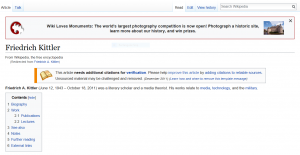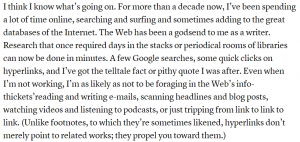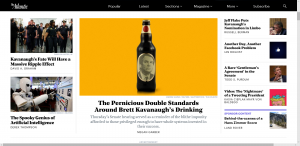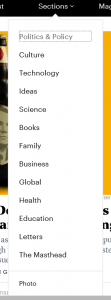Rhetorical Analysis on “Is Google making us stupid?”
The article “Is Google Making Us Stupid?” is a rather persuasive piece written by Nicholas Carr. It focuses on the praiseworthy aspects and shortcomings of online reading. He discusses how, although online reading presents a gateway for newfound aspects of reading not attainable when reading traditionally, it poses potential crippling of the human mind due to lack of traditional-style reading, and therefore deters effective use of concentration and comprehension. He uses a variety of historical sources from recent past and distant past in his essay in order to fortify his argument, which in turn makes for a credible source for a unique aspect on online reading in a technology-driven age. (Carr, “Is Google Making us Stupid?”). Starting with the author, Nicholas Carr is a writer, who has written quite a few books, articles, essays, and even has a blog, all pertaining to the theme of technology and business. Specifically, he’s written 6 books, all of which are about not only technology, but how it’s evolving and how it will affect future generations, whether it be hindering, or immensely prospering. His first piece, Digital Enterprise: How to Reshape Your Business for a Connected World, was published July 1, 2001. It magnifies the evolution of the wonder that has become the internet and how it is changing the world of business, specifically the strategic side of business. Within the book there is a chapter titled “The future of Commerce” (Carr, “Digital Enterprise”) which goes in depth as to how buying and selling through the internet opens new opportunities for business. Carr’s next published work titled Does IT Matter? is in fact an expansion of his Harvard Business Review article “IT Doesn’t Matter.”. It accentuates the importance of information technology and gives it a bigger role in the world of business. A case in point about Carr’s books and essays is that he often using historical evidence as a foundation for his claims. It’s shown throughout all his books and articles, and he even incorporates it in some of his blog posts. A few published books later, Nicholas Carr released what has come to be his most recent book, Utopia Is Creepy: and Other Provocations. Carr speaks on the greatness of technology and what it has done for us. He talks about the advances that technology has made and how it has impacted both the U.S. and the entire world, however, he also expresses that technology isn’t the 2nd coming for a better and brighter future. Keeping all this in mine, Carr’s take on “Is Google Making Us Stupid?” reflects all of his publishing previous of this essay and following this essay.
When talking about the audience, one may ask, “Who is this for? Who is this made for and tailored towards?” You may start by looking at where this was published. The article was published in 2008 on The Atlantic, a magazine well known across the U.S. Being published both in a magazine and online, there has to be a certain income level required to have the excess funds to either purchase the single magazine, subscribe to the magazine, or have access to the internet. It would be fair, at the least, to insinuate that the income level of this audience is middle to upper classed. Another thing you could view to suggest what audience this is targeted to is the vocabulary used in this essay. Nicholas Carr uses an assortment of vocabulary in his essay, and his vocabulary shows that a certain reading level or level of intelligence is required to not only follow along well, but to extract something and comprehend what’s being said and the point that’s being made in this essay. This presumes that most of Carr’s audience has post-secondary education. With that comes age. Granted, this is an essay that assesses online reading, therefore a generation familiar with reading online compared to traditional reading should be the primary focus audience. Anyone who has any amount of post-secondary education is 19+ years old, therefore a good primary audience would be 19-25 year-old, middle to upper class men and women who have post-secondary education. Now of course a good majority of 19-25 year-olds aren’t middle to upper class men and women. However, the family they associate themselves with are. A good secondary audience could be attained looking at the “The Atlantic” website. In the “sections” tab you see the different sciences that The Atlantic magazine contains. They contain all the different sciences such as social sciences, computer sciences, etc. An accurate secondary audience would be either scientists or researchers.
Taking a look at this essay, Nicholas Carr has clear cut purpose. His purpose is to warn people of the dangers that come with online reading. He diversifies his claim with different types of evidence, which includes historical evidence, research evidence, and even his own experiences with technology and its crippling capabilities. In Carr’s essay he states, “media are not just passive channels of information. They supply the stuff of thought, but they also shape the process of thought. And what the Net seems to be doing is chipping away my capacity for concentration and contemplation” (“Is Google Making us Stupid?”). This shows the level of understanding that Carr has of the internet’s powerful influence, however as influential as it may be, the heavy influence is doing more harm than good. A sub argument to Carr’s main claim is that the new way in which information is being delivered is skewing not only the amount we have to process, but how fast we have to process all of it. In the same paragraph as the example previously mentioned, Carr says “Once I was a scuba diver in the sea of words. Now I zip along the surface like a guy on a Jet Ski”(“Is Google Making us Stupid?”). This expresses how people often dived deep into readings in the past, but now we skim over the articles we find and rid of them.
It’s worth noting that where this essay was published and when it was published play a big role in the effectiveness of the entire essay. Being posted to The Atlantic is a big deal, being mindful of how popular the magazine is across the U.S., not to mention the credibility and history of Nicholas Carr. Nicholas Carr specifically writing this essay makes for a better argument due to the fact that he’s written a vast combination of books, articles, essays, and blogs specifically about technology before. The year being 2008, it’s the year filled with up and coming waves of new technology that could make the human population go crazy over the ease of mind technology gives us day to day. However, Carr uses his essay to warn people of the potential threats–both physical and mental–that online reading entails.
The medium in which this information is delivered is quite crucial to the message it’s trying to send. It being in both a magazine and online, Nicholas Carr provides multiple ways for his main purpose to be analyzed, therefore reinforcing the theme of his entire essay–online reading vs. traditional reading. He chooses to publish this specifically in a magazine and online, rather than publishing it in a rather diminishing medium of received information such as the newspapers.
Nicholas Carr uses aspects of rhetoric in order to develop an effective and strong argument against online reading. He uses his history as an author, his audience, as well as context, genre and purpose as the driving force behind his essay. Carr also uses a series of historical evidence and research-based evidence to support his claim. A combination of all this contributes to concisely written piece.
Interface Analysis
There are many examples of how reading an article online that is particularly about online reading that can change and affect your view or your experience of the essay. The first of few examples include the hyperlinks. Hyperlinks will take you to another website, usually to get more information on a person, place, or item that was referenced. This changes your experience because now you have more knowledge and it makes it easier to comprehend ideas that might be necessarily easy to follow:
Another thing to look at is font. The rather simplistic format of the website is tailored around their articles being somewhat formal. Color also matters. The predominantly black and white is fairly “plain” or basic:


The last thing to analyze is the website itself. The website has many different categories and an assortment of sciences. This gives people looking for something else on that site a chance to come by this article, or vice versa:


